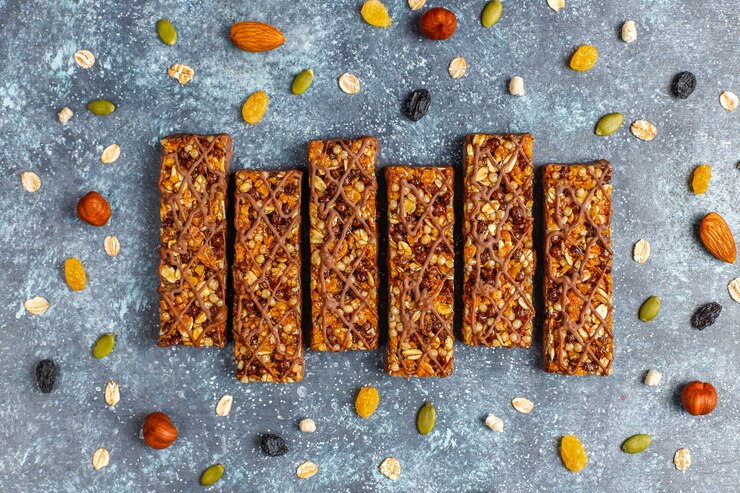Protein bars are convenient, on-the-go snacks designed to provide a boost of protein, essential nutrients, and sometimes other functional ingredients to support various dietary and fitness goals. They come in various flavors, textures, and nutritional profiles, catering to a range of preferences and needs.
Benefits of Protein Bars
- Convenient Protein Source: Ideal for people with busy lifestyles, protein bars offer an easy way to meet daily protein requirements, particularly for athletes, gym-goers, or those on high-protein diets.
- Meal Replacement: Some protein bars are formulated to act as meal replacements, containing a balanced mix of macronutrients (proteins, carbs, fats) to help manage hunger and support weight management.
- Energy Boost: Many protein bars include carbohydrates that provide a quick energy boost, making them suitable for pre- or post-workout snacks.
- Supports Muscle Recovery: Protein is essential for muscle repair and recovery. Consuming a protein bar after exercise can help facilitate the recovery process.
Key Ingredients to Look For
- Protein Sources: Look for bars with high-quality protein sources like whey protein, casein, soy protein, pea protein, or brown rice protein. The protein content can range from 10g to 30g per bar.
- Carbohydrates: Consider the carb content depending on your dietary goals. Some bars are low in carbs (suitable for keto diets), while others contain higher carbs for energy.
- Fats: Healthy fats such as nuts, seeds, and coconut oil add flavor and satiety.
- Fiber: A good protein bar often includes fiber (5g or more) to aid digestion and keep you feeling full.
- Sweeteners: Some protein bars use natural sweeteners like honey, stevia, or monk fruit, while others may contain artificial sweeteners or sugar alcohols like erythritol.
Types of Protein Bars
- High-Protein Bars: Designed primarily to support muscle growth and recovery, often with 20g or more of protein.
- Meal Replacement Bars: Balanced with a mix of proteins, carbs, fats, and fiber to provide a full meal’s nutritional content.
- Low-Carb/Keto Bars: These focus on providing a low-carb, high-fat profile suitable for those on ketogenic diets.
- Energy Bars: Include higher carbohydrate content for a quick energy source, often consumed before or during workouts.
Factors to Consider When Choosing a Protein Bar
- Protein Content: For muscle building, look for bars with 15g to 30g of protein. For a snack, 10g to 15g may be sufficient.
- Caloric Content: Depending on your goal (weight loss, maintenance, or muscle gain), choose a bar with an appropriate calorie range. Meal replacement bars generally contain 250-400 calories, while snack bars might be 150-250 calories.
- Sugar and Sweeteners: Opt for bars with low added sugars. Look for natural sweeteners like stevia or monk fruit to avoid blood sugar spikes.
- Allergens: If you have dietary restrictions or allergies, check for common allergens like nuts, soy, dairy, and gluten.
- Texture and Taste: Protein bars vary in texture (chewy, crunchy, soft) and flavor (chocolate, peanut butter, fruit). Trying a few different types can help find the one you enjoy most.
Conclusion
Protein bars are a versatile option for anyone looking to increase their protein intake conveniently. Choosing the right protein bar depends on your dietary goals, nutritional needs, and taste preferences. Consider factors such as protein source, carb content, sugar, and allergens when selecting the ideal protein bar for your routine.


